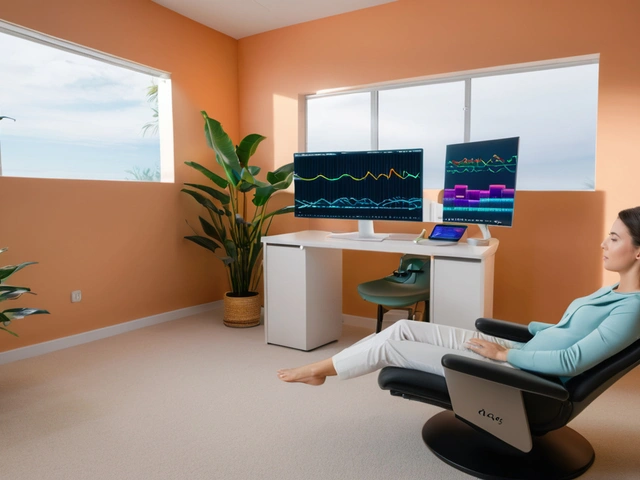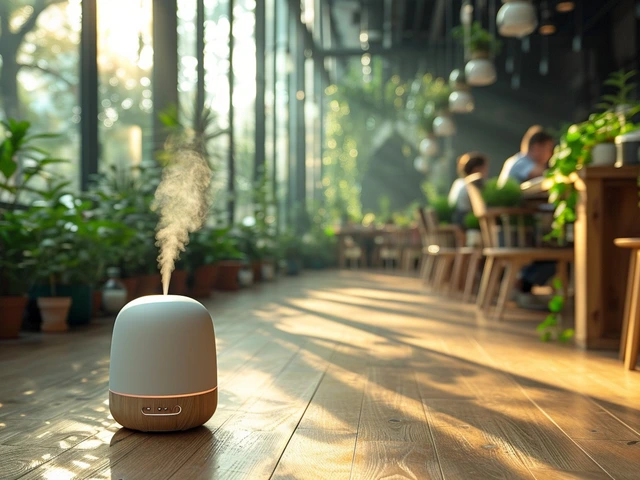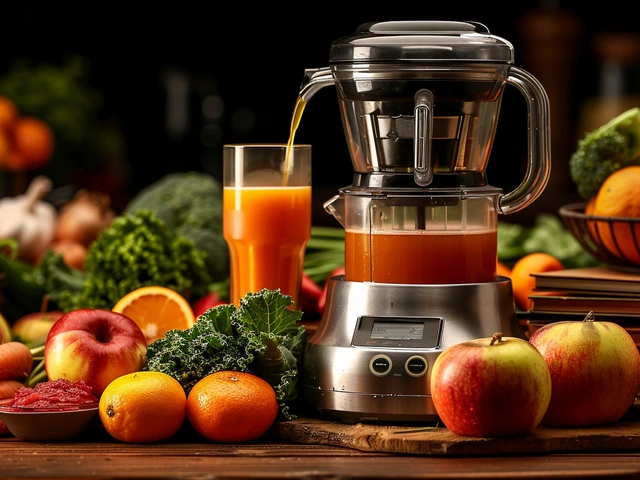
Stepping away from your desk for a snack can be more than just a break; it can be a strategic rejuvenation. This article not only explores the impact of healthy eating on your workday but also provides actionable tips to make these snacks work for you in boosting your productivity and maintaining your focus.
- The Science of Snacking
- Top Healthy Snacks for the Office
- How to Incorporate Healthy Snacks at Work
- Snacking Mistakes to Avoid
The Science of Snacking
The seemingly simple act of snacking is backed by a complex interplay of biological, psychological, and social factors. When we reach for a snack, it's often not just out of hunger. Emotional states, environmental cues, and habits also play pivotal roles. Importance lies in choosing snacks that not only satisfy but also nourish. Healthy snacks can provide a sustained energy boost without the abrupt spike and fall in blood sugar levels, which are typical reactions to more sugary or high-fat snacks.
From a biological standpoint, the brain needs a constant supply of glucose to function optimally. Nutrient-rich snacks like almonds, yogurt, or whole-grain crackers provide a slower release of energy, which helps maintain mental clarity and focus. Contrast this to the short-lived rush provided by less healthy options, which can lead to a crash, further affecting our cognitive functions and mood.
Research underscores the importance of this. A study published in the Journal of Nutrition and Metabolism found that participants who consumed high-protein, high-fiber snacks reported better satisfaction and lower levels of hunger throughout the day, compared to those who snacked on less nutritious options. This satisfaction can greatly reduce overeating at meal times, an essential factor in maintaining a healthy weight.
"Selecting a snack is a small moment of self-care that can have profound impacts on our health," notes nutritionist Dr. Lisa Young.
Understanding these dynamics can transform the way we view snacking. It's not just about quelling hunger, it's about making strategic choices that enhance our mental and physical well-being. By aligning our snacking habits with our body's needs, we adopt a more holistic approach to eating that supports our overall health and work performance.
Top Healthy Snacks for the Office
Imagine sitting at your desk, feeling the mid-afternoon slump creep in. Instead of reaching for that tempting candy bar, you go for a snack that not only satiates your hunger but also enhances your focus and energy. The right snacks can dramatically transform your workday, catalyzing both mental alertness and physical wellness. In the bustling world of nine-to-five jobs, maintaining a nutritionally balanced snack regimen can be a game-changer. Choosing snacks that are rich in protein, low in sugars, and filled with essential nutrients can help stabilize blood sugar levels and prevent the dreaded afternoon crash.
Among the champions of office snacking are almonds. Rich in vitamin E, magnesium, and protein, almonds are a powerhouse that can help manage weight and regulate blood sugar levels. Pairing nuts with a piece of fruit, such as an apple, offers a perfect blend of healthy fats, fiber, and natural sugars, catering to immediate and sustained energy needs. Another fantastic option is Greek yogurt topped with a sprinkle of flaxseeds or berries. This combination delivers a robust dose of protein along with omega-3 fatty acids, which are crucial for brain health and overall cellular function.
For those who enjoy crunchier textures, whole-grain crackers with hummus make an excellent choice. This pairing provides both fiber and protein, assisting in prolonged satiety and improved digestive health. Carrot sticks with guacamole also make a vibrant, nutrient-dense snack option that can brighten any afternoon slump with their splash of color and wealth of vitamins and minerals.
It's important to note that while snacking can be beneficial, the choices must be wise and portion-controlled. Overeating, even healthy snacks, can lead to unintended calorie excess which might contradict your health goals. To avoid this, pre-packaging your snacks can help maintain portion sizes and prevent mindless eating. Implementing these simple strategies might seem mundane but can lead to significant improvements in both health and productivity at the workplace.
How to Incorporate Healthy Snacks at Work
Introducing healthy snacks to your office environment might seem like a small change, but its effects on productivity and overall employee health are significantly positive. The first step is clear: Awareness. Recognizing the times when sugar cravings hit hardest can help in planning better snack options. For instance, mid-morning and mid-afternoon are prime times for energy dips. During these periods, having access to healthy snacks can prevent reaching for the usual sugar-laden treats.
Begin by creating a dedicated 'snack station' in your office. This could be a small area in the kitchen or a specific drawer in your office where everyone knows they can find quick, healthy food options. Stock it with a variety of options that cater to different tastes and dietary requirements. From fruits like apples and bananas that require little to no preparation, to mixed nuts which provide essential fats and protein that help sustain energy levels throughout the day.
Plan ahead by bringing from home every Monday ready to eat meal preps. This could include containers of carrot sticks, celery, and bell peppers along with small servings of hummus or yogurt. Encouragement from management can help solidify these habits, possibly through implementing policies that support healthy eating, like reimbursing employees for healthy snacks or providing company-sponsored nutrition workshops.
Communication is key in fostering a culture of health within the workplace. Weekly newsletters or a dedicated section on the company's intranet can feature tips, recipes, and encouragement for choosing healthier snack options. Recognizing and celebrating the efforts of employees who make healthy choices can also motivate others to follow.
"A healthy outside starts from the inside." - Robert Urich
Finally, remain flexible and open to feedback. Not every healthy snack will be a hit, and what works for one person might not for another. An anonymous suggestion box could be a useful tool for gauging what's popular and what might need replacing. Remember, the goal is to foster a supportive environment that encourages not just individual health, but also a collective well-being.
Snacking Mistakes to Avoid
When it comes to snacking at work, it's easy to fall into patterns that may seem harmless but can undermine our health and productivity. One of the most common mistakes is reaching for whatever is convenient, which often means processed foods packed with sugars and unhealthy fats. These choices might provide an immediate burst of energy, but this is usually followed by a rapid decline, leaving you more tired than before. It's essential to be mindful of the nutritional content of snacks, opting for those that provide sustained energy, like nuts, fruits, or yogurt.
Another snacking pitfall is overindulgence. Even healthy snacks can become detrimental when consumed in large quantities. Portion control is critical; a small, balanced snack can provide the energy boost you need without the extra calories that lead to weight gain. It's helpful to use smaller plates or pre-pack individual portions to keep snacking in check. Keeping track of what you eat throughout the day can also help you manage your overall calorie intake.
Ignoring timing is another oversight many make. Eating right before returning to a task can lead to sluggishness, especially if the snack is high in carbohydrates. Timing your snacks, so they fall mid-morning or mid-afternoon, can keep your energy levels consistent throughout the day. Skipping snacks might seem like a good way to reduce calorie intake, but it often backfires, leading to overeating at mealtime. Regular, nutritious snacks can help maintain blood sugar levels, keeping your mind sharp and ready to tackle your tasks.
Some people don't think about hydration when snacking. Remember, drinks can have just as much impact as food on your energy and health. Sodas and high-sugar juices can spike your sugar levels, akin to unhealthy snacks. Opting for water, herbal teas, or even seltzers can complement your healthy snacking routine, keeping you hydrated and alert without the added sugars that lead to energy crashes.
Finally, variety is the spice of life and this is true for snacks as well. Eating the same apple every day can lead to boredom and potentially lead to unhealthy choices. Keep your snack drawer diverse with a range of flavors and textures that keep your palate excited and your body nourished. Experiment with different fruits, nuts, seeds, and even whole grains to find what satisfies you the most and keeps you energized.





